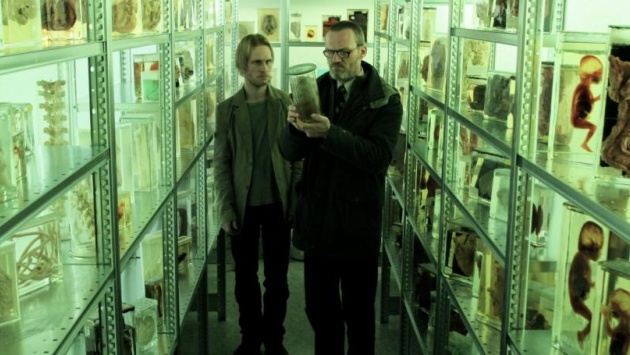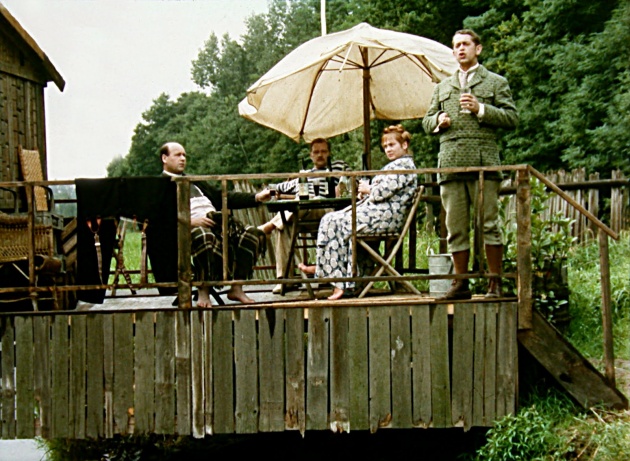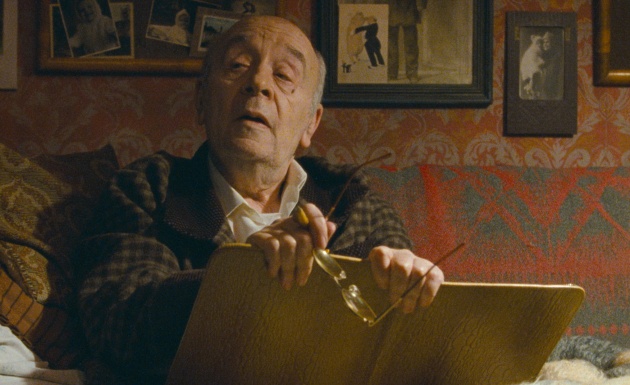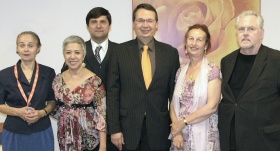42nd Karlovy Vary International Film Festival

Winner of the Crystal Globe 2007: "Jar City" (Baltasar Kormakur)
Times Past
It takes just one visit to Karlovy Vary to become a life-long member of its festival fan club.
My first visit to this unique film event, nestled in the bosom of one of the world’s noblest health spas, was in June of 1968. That 14th edition of the Karlovy Vary International Film Festival was one for the books.
Of course, like everyone else new to the game, I made a point of first drinking the mineral water from the Vridlo, the legendary hot spring that shoots as high as ten meters. And pretended I was hobnobbing with Peter the Great, Bach, Beethoven, Chopin, Paganini, Liszt, Gogol, Turgenev, Freud, Mitternich, Marx, Dvorak, Mazaryk, and Goethe – who, according to a placard on a wall, had journeyed from nearby Weimar to “Karlsbad” on 13 different occasions to quiet his aching portly belly.
More important for KVIFF guests, however, was how the heady atmosphere of the “Prague Spring” would play at the festival. Alexander Dubcek, the newly elected Czechoslovak premier, was advocating freedom of the press, an anathema concept in the Communist Bloc after the fall of Khrushchev.
So, every day, following the morning screening in the Imperial Ballroom of the Grand Hotel Pupp, we marched across the street to Lazne I, the city’s stately spa-bathhouse, to attend a “cultural forum” held in a large banquet hall, where the political news of the hour was discussed.
And there was plenty to talk about. The assassination of Robert Kennedy happened on the second day of the festival. A proposal to reorganize KVIFF as an annual event, instead of alternating with Moscow under FIAPF (International Federation of Film Producers Associations) rules as a biannual festival, was viewed as a legitimate magna carta for the revival of Czechoslovak cinematography.
That year, the festival’s Crystal Globe was awarded to Jiri Menzel’s Capricious Summer (Rozmarné léto, Czechoslovakia, 1967), a visually stylistic parody of the Czech bourgeoisie of the 1920s based on Vladislav Vancura’s comic novel. A light-hearted film, it’s stuffed with scenes reminiscent of Jean Renoir’s A Day in the Country (1936). Menzel himself was applauded during the screening for his adept tight-rope-walking act in the film.

One of the jokes that made the rounds of the festival was how the international jury, considering the circumstances, could even reach a Grand Prix decision. For the jury president was Italian poet-screenwriter Cesare Zavattini, a dyed-in-the-wool soccer fan, who spent most of each day glued to a television set watching Italy win the European Soccer Championship. Still, the very fact that the 65-year-old Zavattini was there at all made news, for as the “father of Italian neorealism” he was not particularly liked by hardliner advocates of Soviet-style socialist realism.
Over the years to follow, and even during Czechoslovakia’s darkest days under Neo-Stalinist premier Gustav Husak, Karlovy Vary was still an absolute must for both health addicts and festival fans. You can’t knock a legendary spa that touted hot mineral springs, specialized health clinics, musical interludes under the colonnades, show windows sporting exquisite crystal glass, and a bounty of good and bad Eastern European film fare.
Another major plus was the opening in 1978 of the Thermal Hotel at the other end of the valley. Designed specifically to house a film festival, its spacious Grand Hall seats 1200 and has plenty of stage room for entertainment shows to boot. In addition, there are four backup venues in the same building for multiplex-style programming. Other A-competition festivals should have it so good.
Times Present
Today, Karlovy Vary is a favorite festival for those finicky film professionals who find the icy winters at the Berlinale too harsh to bear and the waiting lines at Cannes too hard on the legs. Furthermore, since December of 1989, when the Velvet Revolution swept through Czechoslovakia, the city’s historical sites – hotels, villas, baths, monuments – have all been restored to their previous pristine glory.
Among these restorations is the splendid rococo Divadlo Theater, built in 1886 and opened back then with a performance of Mozart’s The Wedding of Figaro. Today, the Divadlo serves as an appropriate festival venue for “Treasures from the National Film Archive.” This year, not to be missed, you could see Fritz Lang’s two-part silent sinister classic, The Spiders I (The Golden Lake) & II (The Diamond Ship) (1919/20), both with live orchestral accompaniment.
Students and young cineastes from across the Czech and Slovak Republics – the country peacefully separated in 1993 – flock to this resort spa with backpacks, many of them sleeping in the park or under the stairs of the Hotel Thermal when it rains. With lines forming before the box office as early at 7:00 in the morning, the only problem is making a decision as to the four films one is entitled to see with a Participation ID Pass – over 10,000 issued in 2007! – after which they are often given permission to sit on the floor at any one of the festival’s 13 venues.
The 42nd Karlovy Vary International Film Festival (29 June to 7 July 2007), under festival president Jiri Bartoska and artistic director Eva Zaoralova, welcomed 12,000 accredited guests, 500 more than in the previous year. Another record was broken when 580 journalists registered for KVIFF, 300 more than in 2006. According to program director Juliette Zacharova, nine world premieres surfaced among the 250 films screened in 13 festival venues – another sure sign of Karlovy Vary’s increasingly favored status among the bigtime film festivals.
Hollywood stars, in particular, have taken a liking to the spa festival. Renee Zellweger, on hand for the screening of Chris Noonan’s Miss Potter, returned the next day to hand veteran Czech puppet-and-animation filmmaker Brestislav Pojar a Crystal Globe for “outstanding artistic contribution to world cinema.” Another honorary globe was handed to Danny DeVito, whose appearance in Jake Paltrow’s comedy The Good Night closed the festival.
As warmly as these stars were received by the festival audience, nothing could match the adulation showered upon the “man of the hour” on closing night. A ten-minute standing ovation greeted the presence of Vaclav Havel, formerly the Czech President, but best known abroad as an initiator of the “Charta 77” human rights declaration, for which he had spent five years in prison under communist rule.
Vaclav Havel, the writer-dramatist whose father had built Barrandov Film Studio in pre-war days, also was instrumental in bringing his friend and colleague Milos Forman back to Prague to help revitalize the Czech film industry in the wake of the Velvet Revolution. No wonder he’s a legend in his own time! Indeed, when he’s around at the festival, even guest stars want their pictures taken with him!
As press conferences go, nothing surpassed the give-and-take chatter at the “New Hollywood” gathering. To begin with, not many youngsters had ever seen any of the eight films in the retrospective on a movie screen. To wit: Peter Bogdanovich’s The Last Picture Show (1971), Hal Ashley’s Harold and Maude (1971), Monte Hellman’s Two-Lane Blacktop (1971), George Lucas’s American Graffiti (1973), Terrence Malick’s Badlands (1973), Martin Scorsese’s Mean Streets (1973), Francis Ford Coppola’s The Conversation (1974), and Steven Spielberg’s The Sugarland Express (1974).
Cybill Shepherd at the press session talked about her “Svengali” relationship with Peter Bogdanovich. Bud Cort remembered how nervous he was while working with Ruth Gordon on Harold and Maude. And Monte Hellman reminisced on trying to direct actor Sam Peckinpah in China 9, Liberty 37 (1978). In passing, some jokes were made about the visible wear-and-tear on the prints found in the Czech Film Archive. But for die-hard film devotees that made the film experience all the more enjoyable!
Crystal Globes
Festival scuttlebutt underscored the ongoing KVIFF contretemps with FIAPF, that blustering organization in charge of competition regulations for member producer associations. Laughingly dubbed by some festival entrepreneurs as the “Festival Institution for Asinine Protection of Favorites,” FIAPF has seldom listed Karlovy Vary among its favored festivals. No matter, for KVIFF thrives on a camaraderie with other festivals that thrive without a nebulous FIAPF stamp-of-approval.
Sundance, for instance.
Last year, Karlovy Vary hit paydirt by inviting the prestigious Sundance Film Festival to present award winners, both features and documentaries, from the festival archive. This tip-of-the-hat paid off on awards night, when Laurie Collyer’s Sherrybaby (USA), the hit of the 2006 Sundance festival, was awarded the Crystal Globe at Karlovy Vary later that year. In addition, the film’s lead actress, Maggie Gyllenhaal, received the prize for Best Actress.
This year, Karlovy Vary linked its fortunes to the Sochi Open Russian Film Festival.
Just a few weeks after Alexei Popogrebsky’s Prostyje veshchi (Simple Things) was awarded an armful of prizes at Sochi, the film garnered the most citations at Karlovy Vary. The Best Actor Award went to Sergei Puskepalis, with an additional Special Mention to noted stage personality Leonid Bronevoi. Simple Things also won the FIPRESCI (International Critics) Award and the Ecumenical Award.

A poignant drama about a low-paid hospital anaesthetist (Sergei Puskepalis), who lives with his wife and teenaged daughter in a crowded communal apartment, Simple Things takes on color and interest when the busted husband and father accepts a side-job caring for a crusty old actor (Leonid Bronevoi) in the last stages of his cancer ailment. Their reluctant affiliation eventually opens up unexpected vistas.
Karlovy Vary thrives on a bundle of official and non-statuary juries. Besides the topliner International Jury, with Variety editor Peter Bart serving as president, noted personalities were summoned to serve on international juries for the Documentary Competition and the East of the West (Central and Eastern European Films) Competition. These, in addition to the FIPRESCI Jury, the Ecumenical Jury, the Netpac (Network for Promotion of Asian Cinema) Jury, the FICC (Film Clubs) Jury, the Europa Cinemas Label (European Exhibitors) Jury, the Independent Camera (Forum of Independents) Jury, and, of course, the Pravo (newspaper) Audience Prize.
Sounds a bit overdone? Hardly.
Take the Asian portfolio, for instance. Altogether, the Netpac Jury, headed by Philip Cheah of the Singapore film festival, had to consider 38 films from the Near and Far East, entries scattered across nearly all of Karlovy Vary’s 20 different sections. Their award went to Eran Kolirin’s Bikur hatizmoret (The Band’s Visit) (Israel/France), previously awarded a FIPRESCI Prize at Cannes.
This year’s Crystal Gobe was awarded to Baltasar Kormakur’s Myrin (Jar City) (Iceland/Germany). A film noir crime thriller based on a bestseller, Jar City had already won four Icelandic Edda Awards and had broken home box office records before arriving at Karlovy Vary. A gripping thriller pegged to parallel stories, it features a loner detective on a murder case with monkeys on his own back (his daughter is a drug addict) and a genetic scientist researching the causes behind his daughter’s mysterious brain illness (that may be tied to the death of a four-year-old girl 30 years ago). The film was also awarded the FICC Prize.
Unfortunately, one exceptional film, reportedly favored by the KVIFF selection committee, could not be programmed in the Competition. Khoonbazi (Mainline) (Iran), codirected by Rakhsham Bani-Etemad and Mohsen Abdolvalab, ended up in the Horizons section instead.
The story of a mother’s painful ordeal in coping with her daughter’s drug addiction, Mainline is the first film dealing specifically with drug addiction among the young to emerge from Iran. It features Baran Kosari, Rakhsham Bani-Etemad’s daughter, in the role of Sara, a middle-class bride-to-be who knows she needs help but keeps falling back into her old ways. A stellar performance in a spellbinding and agonizing film shot mostly on the streets of Tehran.
Mainline could not be entered into the Competition at Karlovy Vary because it had already been previously shown at Toronto.
Here’s the rub. Toronto is listed by FIAPF as a Non-Competitive Feature Film Festival. Nevertheless, films shown at Toronto are apparently not allowed to be programmed in the competition of other FIAPF-recognized festivals.
Yet the Berlinale has been known to bend that FIAPF rule. And so did Cannes.
So why does Karlovy Vary always get the short end of the FIAPF festival stick?
© Ron Holloway, Moving Pictures Magazine, 22 July 2007

